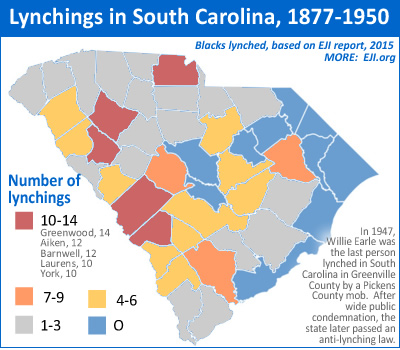
By Andy Brack, editor and publisher | “Lynching” is a word that should be discarded from political discourse, especially throughout the South where thousands died from racial terror after the Civil War.
 President Trump, now under intense scrutiny in a growing impeachment inquiry by the U.S. House of Representatives, tweeted in a diatribe in the wee hours of Oct. 22 that “All Republicans must remember what they are witnessing here – a lynching.”
President Trump, now under intense scrutiny in a growing impeachment inquiry by the U.S. House of Representatives, tweeted in a diatribe in the wee hours of Oct. 22 that “All Republicans must remember what they are witnessing here – a lynching.”
No, Mr. President. You’re wrong. You are not being lynched. You are not being physically ripped from the White House, bundled up ropes and taken by a mob for execution by shooting, hanging, burning or something as horrible.
What is happening, sir, is that you are facing the very process you deny is happening – due process required by the Constitution to investigate whether you and your administration violated the law in discussions with a foreign country. For the U.S. House – Democrats and Republicans – to do less is for them to abrogate their sworn duty.
But because you don’t like what’s happening, can’t control it and want it to go away, you lash out, denigrate and act as unpresidential as any man to ever hold the top office in the land. Perhaps you’re trying to get people to pity you and massage your big ego. Perhaps you’re saying outrageous things to create further division, hoping to sweep under the rug any “Treason, Bribery, or other high Crimes and Misdemeanors” (Article Two, Section 4 of the U.S. Constitution) by your administration.
From 1877 to 1950, an estimated 185 South Carolinians were racially lynched, according to the Equal Justice Initiative. So using a word like “lynching” to describe a process required in constitutional law is beyond the pale. Even as a rhetorical flourish in political debate, it is dangerous and politically patronizing because it reinforces 19th-century attitudes on race. It causes fear. It exacerbates the political and racial divide in a country with a sorry history of dealing with its past sins.
Your political ally, South Carolina’s own U.S. Sen. Lindsey Graham, should know better, too. In a defense of you, he rightfully said lynching was mob rule, but he whitewashed its true meaning by failing to admit its violence: “Yes, African-Americans were lynched, other people have people lynched throughout history. What does lynching mean? That a mob grabs you, they don’t give you a chance to defend yourself, they don’t tell you what happened to you, they just destroy you.”
 Most lynching victims ended up dead, as described in a horrifying column by Michele Norris of the Race Card Project in the Washington Post: “Lynching was a fact of life for much of this country’s existence. It was the green light for decapitating the victim and the impulse to place a head on a stick and then place that stick into the ground on a well-traveled road and leave it there until the sun or the birds or the vermin had their way. Lynching was sometimes not enough. Bodies were burned and blowtorched and branded. They were gutted and skinned like animals. They were castrated, scalped, dismembered.”
Most lynching victims ended up dead, as described in a horrifying column by Michele Norris of the Race Card Project in the Washington Post: “Lynching was a fact of life for much of this country’s existence. It was the green light for decapitating the victim and the impulse to place a head on a stick and then place that stick into the ground on a well-traveled road and leave it there until the sun or the birds or the vermin had their way. Lynching was sometimes not enough. Bodies were burned and blowtorched and branded. They were gutted and skinned like animals. They were castrated, scalped, dismembered.”
Yet the president is alive and kicking. He is flailing away, destroying civility and American institutions, as recognized by some of Graham’s congressional colleagues.
South Carolina’s Tim Scott, the Senate’s only black Republican, didn’t describe the impeachment inquiry as a lynching. Rather, he said, “There’s no question that the impeachment process is the closest thing to a political death row trial, so I get his absolute rejection of the process. I wouldn’t use the word lynching.”
House Majority Whip Jim Clyburn, a South Carolina Democrat, went further on CNN: “I’m a product of the South. I know the history of that word. That is a word that we ought to be very, very careful about using.” Clyburn said he recognized that Trump was “prone to inflammatory statements, and that is one word that no president ought to apply to himself.”
Yet the president continues to lash out at American institutions to try to save his hide. From now until the 2020 election, he’ll likely ramp up the rhetoric to create more division and fear. Stop it. It’s wrong. Face the music.
Andy Brack’s latest book, “We Can Do Better, South Carolina,” is now available in paperback and for Kindle via Amazon.
- Have a comment? Send to: feedback@statehousereport.com.















 We Can Do Better, South Carolina!
We Can Do Better, South Carolina!
Hello Andy,
I’m very disappointed in you. Pull out your Webster’s and read the definition of lynching. NO MENTION of race. It’s undeniable that many black people were lynched, particularly the post-civil war era; however,as a man who earns his living with words, you of all people should understand their value. A word doesn’t belong to a race, or a class or a party (many Democrats called Clinton’s impeachment lynching). Next thing yo know we’ll be burning books.
Great piece Andy.
Andy:
I don’t believe any one group owns any one word in our shared language, and I don’t particularly care to use words designed to incite visceral reactions from others. Further, I do think that the word “lynching” evokes an especially strong visceral reaction from black Americans. For that reason alone, anyone using that word (black, white or other) should do so carefully. So, I agree that the President’s use of the word “lynching” was ill-advised, but I stop short of claiming that it’s use was outrageous.
President Trump (and I don’t necessarily intend to to portray him as victim) understandably feels that he’s being unfairly treated by the House leadership’s chosen impeachment approach. He clearly feels that others mean to do harm to (if not destroy) him politically and may stop at nothing to achieve that purpose. Based upon what I’m seeing, he has cause to feel that way.
So, if he states that he’s being “railroaded,” “lynched,”or whatever word one cares to use, we ought to give him some slack (without ceding to his or his opponents’ views of his actions) and understand that he feels the heat and is claiming unfairness. Not to do so, in my mind, constitutes a partisan attempt to score “points” either for or against him.